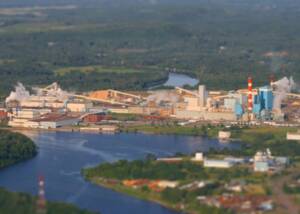Energy prices in Germany far too high, association warns of drastic consequences
News General news
- Production drops significantly by 21 per cent
- Turnover collapses by 25 per cent
- Economic and structural problems at the same time
- Competitiveness acutely threatened by high energy costs
- Association calls for competitive industrial electricity prices and the retention of electricity price compensation

The German pulp and paper industry is facing fundamental changes. The association DIE PAPIERINDUSTRIE shows an alarming situation with its current half-year balance 2023. Compared to the same period last year, total production in Germany shows a decline of almost 21 percent. Sales volume fell by 19.1 percent, turnover decreased disproportionately by 25 percent. Comparing the figures with other European countries, production in Germany is down even more, by an additional minus 5.7 per cent. In the recession, less is bought, less is packaged and less is transported. In addition to graphic papers, cardboard and paperboard, which recently benefited from strong online trade and are generally among the winners of digitisation, are particularly affected.
Economic weakness intensifies structural problems in individual business areas
This is having a particularly hard impact on the graphic paper sector. As a result of digitalisation, the decline in print advertising, newspaper and magazine circulations has been noticeable for years. In combination with the current economic downturn, this threatens the companies. Production of graphic paper had to be drastically reduced by 36.6 per cent in the same period. But also for paper, board and packaging (down 16.4 percent), sanitary papers (down 6.3 percent), technical and speciality papers (down 7.8 percent) the last half-year was anything but satisfactory.
The competitiveness of companies depends on stable framework conditions, the association points out. Germany is experiencing a boom in electricity prices and the burden of levies, surcharges and taxes is also steadily increasing. The electricity tax rate is one of the highest in the EU. Gas prices and levies are also high and well above the 2019 level, all of which makes production in Germany much more expensive. European competitors can operate under much better framework conditions. In economic phases with a weak order situation and fierce international price competition, it is above all the production costs that determine which plants can still generate the orders economically.
Companies need favourable industrial electricity prices
The effects of the poor framework conditions are already noticeable. In July, this affected around 20 percent of the paper industry's production capacity in Bavaria within just one week. International manufacturers were forced to announce closures of two locations for economic reasons. Well over 1,000 jobs were thus lost in the state.
Winfried Schaur, President of DIE PAPIERINDUSTRIE, warns the federal government: "The current situation makes it difficult for Germany to survive in international price competition. In addition to other stable framework conditions, a competitive industrial electricity price must finally be introduced as a bridging solution and the maintenance of the peak compensation must be guaranteed for 2024. Especially in energy-intensive paper production, an affordable and secure energy supply as well as its long-term plannability play a special role for investment decisions. Companies in Germany need this planning security now. If politicians do not act, they will place an additional burden on energy-intensive companies and endanger these industries."
Paper mills stabilise power grids and contribute to sustainable transformation
Germany is losing well-paid jobs with paper mills and is losing economic power in rural regions. The industry's great transformation potential for climate neutrality and for stabilising the electricity grids is lost. Many paper mills adjust their electricity purchases to the availability of electricity and can ramp up the output of their power plants especially when it is scarce and expensive. At the same time, the industry is counting on being able to use future surplus electricity from wind power and photovoltaics to replace fossil fuels. The basic prerequisite for this, however, is low electricity prices. With the abolition of peak compensation, this strategy threatens to become unprofitable due to excessively high electricity taxes. Without the energy-intensive companies, the surplus electricity from renewable energies would then have to be uselessly regulated.










